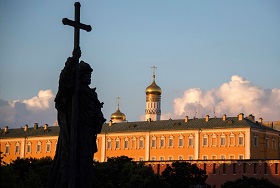For a long time, there’s been a consensus among Russian international experts regarding the idea that the collective West is nearing extinction. It can be considered one of the basic premises of Russian foreign policy doctrine. It has found wide support among experts. In the West itself, there are many who point to the problems of the “liberal world order” and the declining influence of the United States and its allies. Moreover, there is a very deep intellectual tradition of viewing the West as a deteriorating and doomed community.
At the same time, there are a number of signs that the West’s margin of safety remains high. The United States and its allies remain the world’s leading economies. Key technologies are concentrated in their hands. Yes, China is quickly catching up, and in some areas ahead. But the achievements of the PRC do not mean the automatic disappearance of the corresponding competences in the West. Moreover, the race can stimulate the concentration of resources in pursuing large technology projects. The United States and the West as a whole retain their leading positions or are capable of breaking through in all key technological areas.
Despite the obvious problems in the structure of Western alliances, no one else could be able to create similar structures. Neither the SCO, nor the BRICS, nor any other structure can yet compete in terms of the level of consolidation with the Western political and economic blocs. Such structures are very worn out and crack in the wind, but they are in no hurry to fall. Moreover, there is a constant search for new formats. At times it is very chaotic or cynical towards its own allies, as happened with AUKUS. However, local chaos and cynicism have not yet brought down the entire structure.
Social protests, scandals and other upheavals in Western democracies are rather normal. Behind the external fluidity lies the stability of institutions, as well as their ability to digest existing faults and conflicts. At least for now. The erosion of “traditional values” should not be exaggerated either. The West is indeed at the forefront of emancipation, although on this issue it is extremely heterogeneous. Even on the scale of one country, “free morals” can be combined with very radical conservatism.
Without a doubt, in the near term, the collective West will remain a serious military-political and regulatory challenge for Russia. Overestimation of the degree of its extinction and underestimation of the existing potential are fraught with complications in the implementation of Russian national interests.
For a long time, there’s been a consensus among Russian international experts regarding the idea that the collective West is nearing extinction. It can be considered one of the basic premises of Russian foreign policy doctrine. It has found wide support among experts. In the West itself, there are many who point to the problems of the “liberal world order” and the declining influence of the United States and its allies. Moreover, there is a very deep intellectual tradition of viewing the West as a deteriorating and doomed community. It’s enough to recall Nietzsche’s “God Is Dead”, Spengler’s “Decline of the West”, and the discussion about the “Decay of the West” in Russian political philosophy to observe powerful arguments in favour of the death of the capitalist West, both in Marxism and in the modern concepts of neo-Marxists about the “future demise of the capitalist world system”. The conceptual scheme of the waning of the West fits well with the media coverage. The collapse of the Western coalition in Afghanistan, protests and even riots in the United States and Europe, political intrigues between the closest allies, and the erosion of the cultural code amid migration flows, and much, much more.
It would seem that there is nothing to doubt. The proud and selfish giant is about to fall to pieces. And in place of the world order he created, a still incomprehensible, but completely different world will arise. The transition will be painful and turbulent. But the old world with a dominant West will no longer be possible. It could indeed be so. However, this option should still be considered only as one among a number of possible scenarios. “Fading” in itself can take decades, if not centuries. In addition, the future loves to surprise, not always pleasantly. It may turn out that extinction is only part of a wider cyclical picture, and after the stage of turbulence, another round of growth will appear. Strictly speaking, the conventional West has been seething throughout its history. It stands on the bones of bloody wars, revolutions, social upheavals and breakdowns of basic social institutions. However, the West again emerged from the abyss of history, changing political forms, development models and the nature of its expansion. But not disappearing and not retreating forever.
Our own Russian experience should also be considered a great lesson. Some 20 years ago, Russia was considered a state approaching inevitable extinction. Contrary to these expectations, however, the “fading” Russia ignited everything around it so much that many felt uncomfortable. Post-revolutionary Soviet Russia was considered just as doomed in its time, with its hunger, devastation and incomprehensible government. The USSR surprised many. And more than once. The last surprise, however, was its disintegration, also expected by few. Russia’s return to grand politics in the 2000s is unlikely to insure against gloomy scenarios. But it teaches that even extinction is a non-linear and unpredictable process. Its results can be exactly the opposite of the original expectations.
There are several serious arguments in favour of the numerous supporters of the idea of the extinction of the West. The first is the clear limit of political and normative expansion. Middle East interventions have been phased out, although the global presence remains. The “waves of democracy” have faded so far. The second is the growth of major rivals in the face of Russia and China. Both countries pose a serious military and political challenge. In addition, China is developing at a faster pace technologically, while Russia retains its technological groundwork in the field of defence and security. The third is the accumulation of imbalances in the world economy, the politicisation of world finance, fraught with the West losing its leadership in this area. Fourth, there are tensions within the Western security community. Consolidation in the face of the Russian threat has brought NATO back to life. However, attempts to reorient NATO to contain the PRC have not caused enthusiasm yet, and the same could be said of efforts to increase defence budgets. Not everything is simple in the Asian region either. The political fervour of containing the PRC is tempered by the still-high importance of the Chinese market. The prospects for the synchronisation of the European and Asian wings of the Western alliances also raises questions. Fifth — domestic political challenges. Western societies are periodically feverish from social movements, especially intensified against the backdrop of the COVID-19 pandemic.
At the same time, there are a number of signs that the West’s margin of safety remains high. The United States and its allies remain the world’s leading economies. Key technologies are concentrated in their hands. Yes, China is quickly catching up, and in some areas ahead. But the achievements of the PRC do not mean the automatic disappearance of the corresponding competences in the West. Moreover, the race can stimulate the concentration of resources in pursuing large technology projects. The United States and the West as a whole retain their leading positions or are capable of breaking through in all key technological areas.
Despite the obvious problems in the structure of Western alliances, no one else could be able to create similar structures. Neither the SCO, nor the BRICS, nor any other structure can yet compete in terms of the level of consolidation with the Western political and economic blocs. Such structures are very worn out and crack in the wind, but they are in no hurry to fall. Moreover, there is a constant search for new formats. At times it is very chaotic or cynical towards its own allies, as happened with AUKUS. However, local chaos and cynicism have not yet brought down the entire structure.
The defeat of the democratisation and modernisation of Afghanistan, as well as the retreat of democracy in a number of other countries and regions does not mean the collapse of the Western normative model. No other community has yet been able to successfully exploit the values of freedom, human rights, the rule of law, and other principles of the Enlightenment, while maintaining democracy as the main political value. The West will remain a significant value guide. China, Russia and any other power may well offer intelligible projects for their internal audiences based on patriotism and their own culture. But they will be forced to wage a constant defensive war. On the field of values, they lack the means for a large-scale offensive. Patriotism is a powerful tool for internal consolidation, but it cannot be exported outside. Western leaders also build their identity on their own patriotism. But they also have the potential to export a more universal value framework. That is, they are capable of pursuing an active, offensive policy in the field of values. Failures in such a policy are inevitable. That does not mean the termination of such attempts and their failure in the future.
Social protests, scandals and other upheavals in Western democracies are rather normal. Behind the external fluidity lies the stability of institutions, as well as their ability to digest existing faults and conflicts. At least for now. The erosion of “traditional values” should not be exaggerated either. The West is indeed at the forefront of emancipation, although on this issue it is extremely heterogeneous. Even on the scale of one country, “free morals” can be combined with very radical conservatism.
Without a doubt, in the near term, the collective West will remain a serious military-political and regulatory challenge for Russia. Overestimation of the degree of its extinction and underestimation of the existing potential are fraught with complications in the implementation of Russian national interests.
First published in the Valdai Discussion Club.






